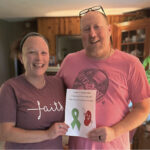 Cold and influenza season is upon us, and, often times, people are not sure which one they have since the symptoms can be very similar. However, knowing the difference between the two is key to getting better if you become sick.
Cold and influenza season is upon us, and, often times, people are not sure which one they have since the symptoms can be very similar. However, knowing the difference between the two is key to getting better if you become sick.
The flu produces more serious symptoms, and it’s especially important to treat yourself correctly if you have it. The flu can lead to complications such as pneumonia, bronchitis, bacterial infections, sinus and ear infections, and even hospitalization. Children under
5 years old, pregnant women, those over 65, and people with compromised immune symptoms are at higher risk for flu-related complications.
The flu is highly contagious and can be spread through coughing, sneezing or even talking to someone who is infected. Most people can infect someone with the flu one day before their symptoms develop and five to seven days after they’ve become sick.
Symptoms of the flu include:
- Fever, body aches, chills and exhaustion. You may have a dry cough.
- Treatment: Rest, drink plenty of fluids and take medication to decrease your symptoms. Call your doctor if you experience severe symptoms such as shortness of breath, very high fever or pain in your face/eyes or teeth that doesn’t improve.
- Prevention: The best protection is to get a flu shot. Since strains of the flu are different each year, it’s recommended that you get a flu shot annually. Also, wash your hands often and keep them away from your face to prevent the spread of germs. Eating a balanced diet and staying well rested will also help to build your immune system.
If you do come down with the flu, prescription antiviral drugs can decrease your symptoms and shorten the amount of time you are sick. They also can help you avoid more serious complications. They are not sold over the counter, so you must see a physician to get an antiviral. As a reminder, antivirals are different than antibiotics. Antibiotics won’t help your flu symptoms.
While you can get a common cold any time of the year, your chances are higher during the winter months. Having a cold can be pretty annoying and make you feel just plain lousy. While it is a respiratory illness like the flu, colds are much less serious. They can last seven to 10 days, and the first sign is usually a sore throat and a runny nose.
Symptoms of the common cold include:
- Runny and stuffy nose, sneezing, cough and sore throat. This can last up to two weeks and can lead to other issues like ear or sinus infections.
- Treatment: Slow down your regular routine and get rest. Drink plenty of fluids, especially hot teas or soups to relieve your stuffy nose and head.
Gargling with warm water will help with postnasal drip.
- Prevention: Wash your hands often and get plenty of sleep to keep your immune system healthy.
Unfortunately, there is no cure for a cold. It’s one of those things that just needs to run its course. Over-the-counter medications can give you some relief from your symptoms, but only time will make you feel like yourself again.
While colds are usually more of an annoyance than a serious health threat, when it comes to children, there are times when you should call your doctor. The Centers for Disease Control recommends that you call your doctor if you or your child has one or more of these conditions:
- A temperature higher than 100.4 degrees Fahrenheit
- Symptoms that last more than 10 days
- Symptoms that are severe or unusual
If your child is younger than 3 months old and has a fever, you should call your doctor right away. They can determine if your child has a cold and can recommend proper treatment to help with symptoms.
Prevention and good health habits are the best way to keep yourself well during cold and flu season. Get a flu shot for yourself and your children, wash your hands often, sneeze and cough into a tissue or your elbow to prevent spreading germs, and, most importantly, stay home if you are sick. We can all play our part in keeping our community healthy this winter by practicing these simple steps.
Dr. Denise Harr, board certified in family medicine, is senior medical director of Medical Value Initiatives at Capital BlueCross, a community publisher for TheBurg.





